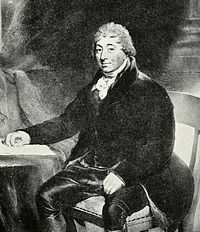Sir Robert Wigram, 1st Baronet
| Sir Robert Wigram, Bt | |
|---|---|
 | |
| Born | 1744 |
| Died | 1830 |
| Citizenship | British |
| Occupation | Businessman and member of Parliament |
| Title | Baronet |
| Spouse(s) | Mary Clifford |
Sir Robert Wigram, 1st Baronet (30 January 1744 – 6 November 1830) was a British merchant shipbuilder and Tory politician who sat in the House of Commons of Great Britain and of the United Kingdom between 1802 and 1807.
Background
Wigram was born at Wexford, the only son of John Wigram, merchant, of Bristol, and his wife Mary Clifford daughter of Robert Clifford of Wexford and granddaughter of Highgate Boyd.[1]
Public life
In 1762 Wigram took up an apprenticeship with Dr Allen of Dulwich London, and two years later he was a fully qualified surgeon. He and sailed to India on the East Indiaman 'Admiral Watson' as ship's surgeon, but retired from this position in 1772 because of failing health and became a successful merchant. He developed the family's mercantile activities and made several voyages to India in the service of the Company. He was the sole, or at least principal owner, of several vessels trading to Bengal, Madras, and Bombay and was one of the greatest importers of drugs in England.[2]
Wigram was returned to Parliament in 1802 as Member of Parliament for Fowey[3] and was a strong supporter of William Pitt. He was Chairman of the meeting of the merchants and bankers during the French Revolution and was instrumental in raising the Regiment of the Sixth Royal London Volunteers, becoming their Lieutenant-Colonel in September 1803.[2] Also in July 1803, he led a group of shipowners in securing an Act "for the further Improvement of the Port of London, by making Docks and other works at Blackwall for the Accommodation of the East India shipping in the said Port", and established the East India Dock Company.[4] He was created a baronet on 20 October 1805. At the general election in 1806, he was chosen for the Wexford Borough[5] but after the dissolution in 1807 he retired from public life. Sir Robert was a Vice-President of the Pitt Club. He had partnerships in the Blackwall Yard, Reid’s Brewery and Huddart’s Rope Works. In 1805 he bought a large share of Deptford shipbuilders formerly 'Perry, Wells & Green' and the firm became 'Wigram, Wells & Green'. By 1813 Wigram had taken over all the Wells interest and it became 'Wigram & Green'. He owned half the business, his sons Money and Loftus Wigram a quarter, and Green the remaining quarter. Wigram retired in 1819 and sold his half to the other partners.[6] He was appointed High Sheriff of Essex for 1812–13.
Wigram died at Walthamstow House, his home at Walthamstow, Essex, at the age of 86.
Family
Wigram was twice married and had a large family of twenty-three children.[7] His first wife was Catherine Broadhurst, by whom be had six children. Following Catherine’s death, in 1787 he married Eleanor, widow of Captain Agnew and daughter of John Watts, secretary to the victualling office of Southampton. They had thirteen sons and four daughters.[8] His children included Sir Robert Fitzwygram, 2nd Baronet, James Wigram, Octavius Wigram, Joseph Cotton Wigram, Loftus Wigram and George Wigram. His ninth and youngest son Reverend William Pitt Wigram was the grandfather of Clive Wigram, 1st Baron Wigram. Another descendant was Ralph Wigram, grandson of Joseph Cotton Wigram.
References

- ↑ John Debrett, William Courthope, Debrett's Baronetage of England
- ↑ 2.0 2.1 Edmund Burke, John Davis The Annual register, or, A view of the history, politics, and literature for the year 1830, Volume 72
- ↑ Leigh Rayment's Historical List of MPs – Constituencies beginning with "F"
- ↑ The East India Docks: Historical development, Survey of London: volumes 43 and 44: Poplar, Blackwall and Isle of Dogs (1994), pp. 575-582. Date accessed: 6 February 2009
- ↑ Leigh Rayment's Historical List of MPs – Constituencies beginning with "W" (part 3)
- ↑ National Maritime Museum About the Green Blackwall Collection
- ↑ Register of the Wigram family 1743-1913
- ↑ Allen Memorial Art Museum
- Gentleman's Magazine Obituary 1830
- Oxford Dictionary of National Biography, Anne Pimlott Baker, Wigram, Sir Robert, first baronet (1744–1830), 2004
- Lubbock, basil (1922). Blackwall Frigates. available online at
- Robert Wigram; Henry Green (1881). Chronicles of Blackwall yard. available online at
| Parliament of Great Britain | ||
|---|---|---|
| Preceded by Reginald Pole-Carew Edward Golding |
Member of Parliament for Fowey 1802–1806 With: Reginald Pole Carew |
Succeeded by Reginald Pole-Carew Robert Wigram (junior) |
| Preceded by Richard Nevill |
Member of Parliament for Wexford Borough 1806–1807 |
Succeeded by Richard Nevill |
| Baronetage of the United Kingdom | ||
| New creation | Baronet (of Walthamstow) 1805–1830 |
Succeeded by Robert Wigram |